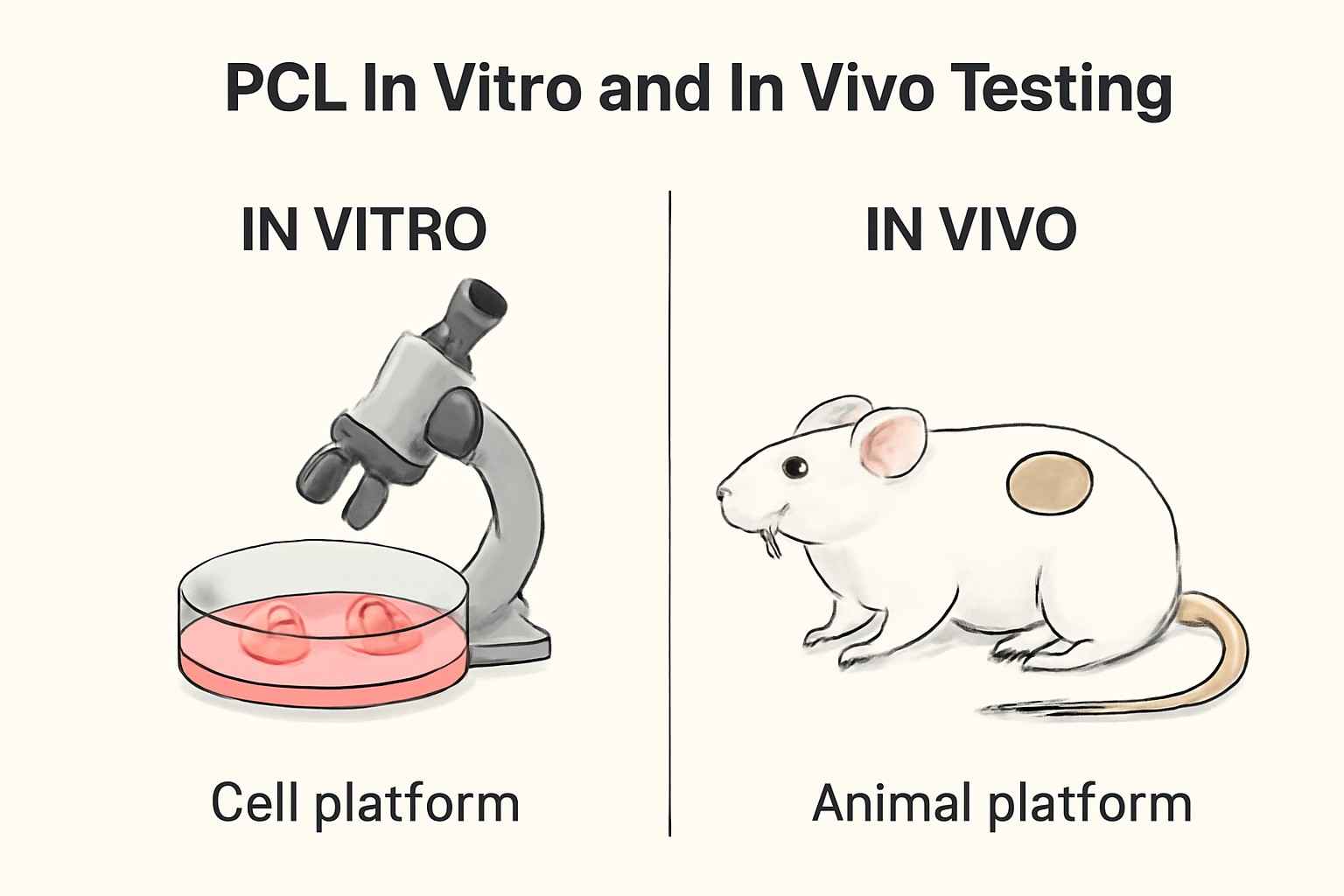
BOC Sciences is committed to providing comprehensive testing services for polycaprolactone (PCL) and its microsphere formulations in the fields of medical aesthetics, cosmetics, and biomedicine. Our in vitro (cell platform) and in vivo (animal platform) testing solutions offer multi-level product evaluations to ensure the safety and effectiveness of PCL microspheres across various applications. In vitro testing utilizes the cell platform to simulate real biological environments, assessing key parameters such as cell compatibility, toxicity, and drug release. In contrast, in vivo testing leverages the animal platform for in-depth evaluations of biodistribution, degradability, immune responses, and therapeutic efficacy, delivering more precise preclinical data. These testing services provide clients with reliable scientific evidence to accelerate the research, development, and commercialization of PCL microsphere formulations.
PCL features a slow-degrading nature, and its degradation behavior differs significantly between in vitro and in vivo environments, affecting drug efficacy control. BOC Sciences addresses this by combining long-term release models, enzyme degradation simulations, and in-tissue tracking experiments to comprehensively evaluate the degradation kinetics of microspheres.
Traditional imaging technologies struggle to clearly capture the dynamic in vivo distribution of microspheres, hindering targeting evaluations. BOC Sciences utilizes fluorescence labeling, radiotracers, and small animal imaging systems to enable visualized and dynamic monitoring of microsphere migration and distribution in vivo.
Cells derived from different tissues show varying responses to PCL microspheres, and a unified evaluation standard is lacking. BOC Sciences has established a comprehensive testing system with multiple human and animal-derived cell models, offering structured assessments for cytotoxicity, proliferation, and inflammatory response.
In vivo studies are prone to physiological interference, which can reduce reproducibility and stability, affecting product evaluation efficiency. BOC Sciences enhances data consistency and reproducibility through standardized animal model construction and regulated experimental procedures.
Uneven drug release rates from microspheres make it difficult to accurately assess blood drug concentrations and tissue exposure. BOC Sciences has established a high-sensitivity LC-MS/MS platform and integrated sampling and analysis to achieve precise pharmacokinetic evaluation of microsphere-based drug delivery systems in vivo.
Some functional microspheres involve complex mechanisms such as immune modulation and anti-inflammation, which cannot be clearly validated by traditional methods. BOC Sciences supports mechanism studies by offering services such as ELISA for inflammatory factors, immune co-culture systems, and cell signaling pathway analysis.
Relying on its advanced cell biology experimental platform, BOC Sciences provides systematic in vitro evaluation services for the development of PCL and its microsphere formulations. Through multidimensional and multi-model experimental designs, we help clients quickly determine biocompatibility, safety, and functionality during early material development, thus effectively shortening R&D cycles and reducing failure risks before animal testing.
Cytotoxicity testing is a key step in preliminary material screening and safety assessment. BOC Sciences applies multiple internationally recognized methods to ensure comprehensiveness and comparability of results, including:
PCL materials must not only be safe and non-toxic but also support normal cell behavior. We can perform assessments for the following parameters:
PCL degrades slowly in vivo, producing mainly ε-caprolactone monomers and medium-short-chain fatty acids, which are theoretically biocompatible but still require validation in real formulations. BOC Sciences offers:
For PCL microspheres loaded with active molecules (e.g., antioxidants, peptides, vitamins, drugs), BOC Sciences provides comprehensive in vitro controlled release evaluations, including:
In aesthetic fillers and tissue repair products, immune response control is critical. BOC Sciences utilizes cell models to evaluate whether PCL microspheres induce adverse inflammatory responses:
After preliminary screening through in vitro tests, BOC Sciences offers deeper in vivo evaluation through its animal platform to simulate the real biological performance of PCL and its microsphere formulations. These animal models effectively reflect material metabolism, distribution, degradation, functional efficacy, and potential biocompatibility issues in the human body, helping clients prepare for final clinical trials.
In medical aesthetics and dermatology applications, PCL microspheres are widely used for localized drug delivery and promotion of skin repair and regeneration. BOC Sciences provides animal platforms to assess the effects of PCL microspheres in skin healing, suitable for trauma repair, burn treatment, and anti-aging applications.
The immune response to PCL materials in various animals is a critical factor in material development. BOC Sciences' animal models can simulate immune responses to PCL and its microsphere formulations, including acute, chronic, and allergic reactions.
Biodegradability and in vivo distribution of PCL microspheres are key characteristics for their application in biomedical materials. BOC Sciences performs accurate in vivo analyses to assess degradation rates, tissue impacts of degradation products, and microsphere distribution.
For clinical-grade PCL microsphere formulations, BOC Sciences provides comprehensive systemic toxicity evaluations. Through long-term animal studies, we detect whether microsphere formulations cause damage to non-target organs.
BOC Sciences possesses advanced animal and cell platforms. Our cell platform employs cutting-edge cell culture technologies that simulate real biological environments to conduct functional evaluations such as cell compatibility, toxicity, and drug release. Through the application of various cell lines, we can assess the cellular uptake, metabolic processes, and biological impacts of PCL microspheres on different cell types, ensuring their safety and efficacy in the biomedical field. Meanwhile, BOC Sciences' animal platform utilizes various animal models such as mice and rats to precisely evaluate the in vivo pharmacokinetics, immune response, degradation characteristics, and long-term biocompatibility of PCL microspheres. By integrating imaging, biochemical, and pathological analyses, we provide clients with comprehensive in vivo data to accelerate product development and clinical translation.
BOC Sciences' in vivo and in vitro testing services offer comprehensive support for the study of PCL and its microsphere formulations, aiding their application across multiple fields. Through advanced cell platforms (in vitro testing) and animal platforms (in vivo testing), we can accurately assess the performance and safety of PCL microspheres in industries such as medical aesthetics, cosmetics, and biomedicine. These testing services not only assist clients in optimizing product design but also ensure compliance with industry standards, promoting innovative applications of PCL technology. Whether for skin repair, anti-aging, oil control, deep cleansing, or other fields, BOC Sciences provides reliable testing support, offering strong scientific validation for product development and helping clients accelerate market entry.